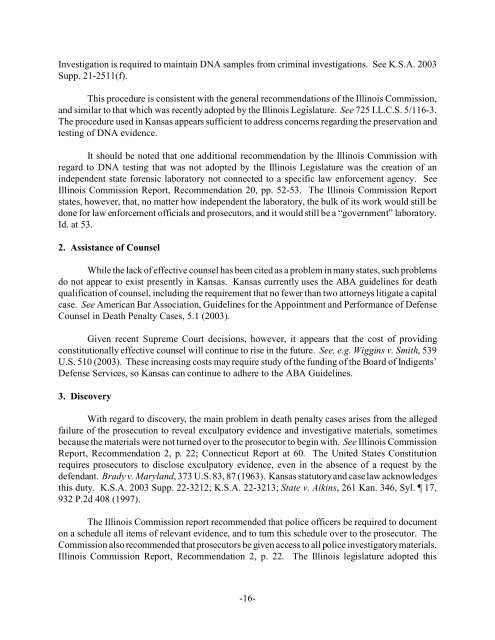report of the kansas judicial council death penalty advisory
report of the kansas judicial council death penalty advisory
report of the kansas judicial council death penalty advisory
You also want an ePaper? Increase the reach of your titles
YUMPU automatically turns print PDFs into web optimized ePapers that Google loves.
Investigation is required to maintain DNA samples from criminal investigations. See K.S.A. 2003<br />
Supp. 21-2511(f).<br />
This procedure is consistent with <strong>the</strong> general recommendations <strong>of</strong> <strong>the</strong> Illinois Commission,<br />
and similar to that which was recently adopted by <strong>the</strong> Illinois Legislature. See 725 I.L.C.S. 5/116-3.<br />
The procedure used in Kansas appears sufficient to address concerns regarding <strong>the</strong> preservation and<br />
testing <strong>of</strong> DNA evidence.<br />
It should be noted that one additional recommendation by <strong>the</strong> Illinois Commission with<br />
regard to DNA testing that was not adopted by <strong>the</strong> Illinois Legislature was <strong>the</strong> creation <strong>of</strong> an<br />
independent state forensic laboratory not connected to a specific law enforcement agency. See<br />
Illinois Commission Report, Recommendation 20, pp. 52-53. The Illinois Commission Report<br />
states, however, that, no matter how independent <strong>the</strong> laboratory, <strong>the</strong> bulk <strong>of</strong> its work would still be<br />
done for law enforcement <strong>of</strong>ficials and prosecutors, and it would still be a “government” laboratory.<br />
Id. at 53.<br />
2. Assistance <strong>of</strong> Counsel<br />
While <strong>the</strong> lack <strong>of</strong> effective counsel has been cited as a problem in many states, such problems<br />
do not appear to exist presently in Kansas. Kansas currently uses <strong>the</strong> ABA guidelines for <strong>death</strong><br />
qualification <strong>of</strong> counsel, including <strong>the</strong> requirement that no fewer than two attorneys litigate a capital<br />
case. See American Bar Association, Guidelines for <strong>the</strong> Appointment and Performance <strong>of</strong> Defense<br />
Counsel in Death Penalty Cases, 5.1 (2003).<br />
Given recent Supreme Court decisions, however, it appears that <strong>the</strong> cost <strong>of</strong> providing<br />
constitutionally effective counsel will continue to rise in <strong>the</strong> future. See, e.g. Wiggins v. Smith, 539<br />
U.S. 510 (2003). These increasing costs may require study <strong>of</strong> <strong>the</strong> funding <strong>of</strong> <strong>the</strong> Board <strong>of</strong> Indigents’<br />
Defense Services, so Kansas can continue to adhere to <strong>the</strong> ABA Guidelines.<br />
3. Discovery<br />
With regard to discovery, <strong>the</strong> main problem in <strong>death</strong> <strong>penalty</strong> cases arises from <strong>the</strong> alleged<br />
failure <strong>of</strong> <strong>the</strong> prosecution to reveal exculpatory evidence and investigative materials, sometimes<br />
because <strong>the</strong> materials were not turned over to <strong>the</strong> prosecutor to begin with. See Illinois Commission<br />
Report, Recommendation 2, p. 22; Connecticut Report at 60. The United States Constitution<br />
requires prosecutors to disclose exculpatory evidence, even in <strong>the</strong> absence <strong>of</strong> a request by <strong>the</strong><br />
defendant. Brady v. Maryland, 373 U.S. 83, 87 (1963). Kansas statutory and case law acknowledges<br />
this duty. K.S.A. 2003 Supp. 22-3212; K.S.A. 22-3213; State v. Aikins, 261 Kan. 346, Syl. 17,<br />
932 P.2d 408 (1997).<br />
The Illinois Commission <strong>report</strong> recommended that police <strong>of</strong>ficers be required to document<br />
on a schedule all items <strong>of</strong> relevant evidence, and to turn this schedule over to <strong>the</strong> prosecutor. The<br />
Commission also recommended that prosecutors be given access to all police investigatory materials.<br />
Illinois Commission Report, Recommendation 2, p. 22. The Illinois legislature adopted this<br />
-16-

















